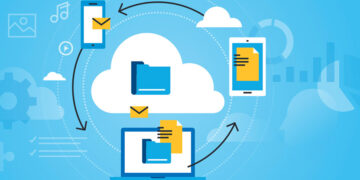In the past, the cloud was seen as a technology for large enterprises, a complex and expensive infrastructure that was out of reach for a small business. Today, that perception is a relic of the past. The cloud computing revolution has fundamentally democratized technology, offering small businesses the same powerful tools and resources that were once the exclusive domain of Fortune 500 companies. Cloud for Small Businesses is no longer a luxury but a strategic imperative that is enabling a new era of innovation, efficiency, and growth. This article will provide a comprehensive look into the world of cloud computing for small businesses. We will explore the key benefits, from cost efficiency and scalability to enhanced security and collaboration, and delve into the new challenges that are defining its next chapter. We will also offer a strategic roadmap for how a small business can successfully navigate this intricate environment and leverage the cloud to thrive in a competitive market.
The Transformative Benefits of Cloud for Small Businesses

The cloud is a game-changer for small businesses, offering a host of benefits that were once out of reach. By moving their operations to the cloud, a small business can level the playing field and compete with larger companies in a way that was not possible in the past.
A. Cost Efficiency and a Pay-as-You-Go Model: One of the most compelling benefits of the cloud for a small business is its cost efficiency.
- No Upfront Investment: A small business no longer has to make a massive upfront investment in hardware, servers, and IT infrastructure. The cloud’s “pay-as-you-go” model means that a business only pays for the resources that it uses, which can lead to a significant cost savings. This is a game-changer for a small business that is trying to manage its cash flow.
- Reduced IT and Maintenance Costs: The cloud also eliminates the need for a dedicated IT team to manage and maintain the infrastructure. The cloud provider handles everything from security and backups to updates and maintenance, which frees up a small business’s resources to focus on its core business.
B. Unprecedented Scalability and Flexibility: The cloud’s scalability is a major advantage for a small business that is trying to grow.
- Scaling on Demand: A small business can scale its infrastructure up or down in a matter of minutes to meet demand. For example, an e-commerce business can scale its servers to handle a sudden surge in traffic on a Black Friday, and then scale it down when the traffic returns to normal. This flexibility is a game-changer for a small business that has unpredictable traffic patterns.
- Global Reach: The cloud’s global network of data centers means that a small business can have a global reach without the need for a physical presence in every country. This is a massive advantage for a small business that is trying to sell its products or services to customers around the world.
C. Enhanced Security and Resilience: Many small businesses have a misconception that the cloud is less secure than their on-premises infrastructure. The reality is the opposite.
- Enterprise-Grade Security: The major cloud providers have invested billions of dollars in building a secure infrastructure. They have a team of security experts who are working around the clock to protect their systems from a growing array of cyber threats. A small business, by moving to the cloud, can leverage this enterprise-grade security that would be impossible to build on its own.
- Built-in Redundancy and Backups: The cloud’s infrastructure is built with a high degree of redundancy and backups. If a server fails in one data center, the service can automatically failover to another one. This ensures that a small business’s data is always safe and that its services are always running.
D. Improved Collaboration and Productivity: The cloud has fundamentally reshaped how a small business’s employees collaborate and work together.
- Real-Time Collaboration: The cloud’s real-time collaboration tools, such as Google Workspace and Microsoft 365, allow employees to work together on the same document at the same time, regardless of their physical location. This is a game-changer for a small business that has a remote or a hybrid workforce.
- Mobile Access: The cloud’s mobile access means that a small business’s employees can access their data and applications from anywhere in the world, on any device. This flexibility is a major advantage for a small business that is trying to compete in a mobile-first world.
Key Cloud Services for Small Businesses
The cloud is a vast and complex ecosystem of services, but a small business doesn’t need to use all of them. Here are some of the key cloud services that are a game-changer for a small business.
A. Cloud Storage and Backup: Cloud storage services, such as Google Drive, Dropbox, and Microsoft OneDrive, are a great way for a small business to store its data in a secure and accessible way.
- Data Security: Cloud storage services encrypt a business’s data, which protects it from a breach.
- Automated Backups: They also provide automated backups, which ensures that a small business’s data is always safe and can be recovered in the event of a disaster.
B. Software as a Service (SaaS): SaaS is a model where a business uses a software application that is hosted in the cloud, rather than installing it on its own servers.
- Office Productivity: SaaS platforms like Google Workspace and Microsoft 365 provide a suite of office productivity tools, from email and word processing to video conferencing and collaboration.
- Customer Relationship Management (CRM): SaaS platforms like Salesforce and HubSpot provide a suite of tools for managing a business’s customer relationships, from sales and marketing to customer service.
- Accounting and Finance: SaaS platforms like QuickBooks and Xero provide a suite of tools for managing a business’s finances, from invoicing and payroll to tax preparation.
C. Infrastructure as a Service (IaaS) and Platform as a Service (PaaS): For a small business that has a need for more advanced cloud services, IaaS and PaaS are a game-changer.
- IaaS: IaaS platforms like AWS, Google Cloud, and Azure provide a business with a virtual infrastructure, including virtual machines, storage, and networking. This is a great option for a small business that wants to build and deploy its own applications.
- PaaS: PaaS platforms provide a business with a platform for building, deploying, and managing its applications. This is a great option for a small business that wants to focus on its code, not on its infrastructure.
D. Cloud-Based Security Solutions: The cloud is a great platform for a small business to enhance its security.
- Managed Security Services: A small business can use a cloud-based managed security service to protect its network from a growing array of cyber threats, such as a phishing scam or a ransomware attack.
- Identity and Access Management (IAM): The cloud’s IAM tools can be used to manage a small business’s users and to ensure that they have access to the right data and applications.
The New Challenges for Small Businesses

While the cloud offers a host of benefits, it also introduces a new set of challenges that a small business must be prepared to address.
A. Security and Misconfiguration: The number one security risk for a small business is not a sophisticated hacker; it is a simple misconfiguration.
- Lack of Expertise: A small business may not have the in-house expertise to properly configure its cloud services, leaving a digital door wide open for an attacker.
- “Shared Responsibility” Model: The “shared responsibility” model, which holds that the cloud provider is responsible for the security of the cloud, but the user is responsible for the security in the cloud, can be a source of confusion for a small business.
B. Cost Management and “Cloud Waste”: While the cloud’s pay-as-you-go model can be cost-effective, it can also lead to a new phenomenon: “cloud waste.”
- Unused Resources: A small business may provision a new server for a project and then forget to turn it off when the project is complete. This can lead to a massive overspend.
- Lack of a “Culture of Cost”: A small business may not have a “culture of cost” where every employee is incentivized to be mindful of their cloud spending.
C. Vendor Lock-in and Portability: While a small business may have the flexibility to move its data and applications between different cloud providers, in reality, this is a complex and often time-consuming process.
- Proprietary APIs: The APIs and services of a cloud provider are often proprietary, which can make it difficult to move an application from one provider to another.
- Lack of Expertise: A small business may not have the in-house expertise to manage a multi-cloud environment, which can lead to a new layer of complexity.
D. The “Digital Citizen” vs. The “Digital Business”: The cloud has made it easier than ever for an individual to start a business with a single line of code. This “digital citizen” vs. “digital business” dynamic is a new legal and ethical challenge.
- Legal Liability: A small business that is operating in the cloud is subject to a wide range of legal and regulatory requirements, such as GDPR and CCPA. A failure to comply can result in significant fines.
- The “Black Box” Problem: The “black box” nature of many AI systems, where it is difficult to explain how a decision was made, is a major ethical and legal challenge for a small business that is using these systems to make a business decision.
A Strategic Roadmap for Small Business Cloud Adoption
Successfully navigating the cloud is not a one-time project; it is a strategic roadmap that requires a commitment to continuous learning and a cultural shift.
A. Start with a Clear Strategy: The first step is to have a clear strategy.
- Assess Your Needs: What are your business’s needs? Do you need a cloud-based email system? A CRM platform? A website? A clear understanding of your needs will guide your choice of a cloud service.
- Start Small: The best approach is to start small and learn. Begin with a single, non-critical application and use it as a learning opportunity.
B. Invest in Training and Education: The complexity of the cloud requires a significant investment in training and education.
- Online Courses: The major cloud providers, as well as a number of third-party vendors, offer a variety of online courses and training platforms.
- A Cloud Consultant: A small business can also hire a cloud consultant to help it with its cloud strategy and to provide guidance on best practices.
C. Prioritize Security and Governance: The security of a small business’s data is a top priority.
- A Clear Security Policy: A small business must have a clear security policy that outlines what employees can and cannot do in the cloud.
- Automated Security: A small business should use automated security tools to scan its cloud environment for vulnerabilities and misconfigurations.
D. Embrace the “Culture of Cost”: A small business must embrace a “culture of cost” where every employee is incentivized to be mindful of their cloud spending.
- A Cost Dashboard: A small business can use a cost dashboard to provide a real-time view of its cloud spending.
- Automated Optimization: A small business can use automated tools to shut down idle resources and to right-size its virtual machines and services.
E. The Role of the Digital Citizen: The cloud has made it easier than ever for an individual to start a business.
- Legal Compliance: A small business must be aware of the legal and regulatory requirements that apply to it.
- Ethical Use of Technology: A small business must use technology in a way that is ethical and that is aligned with the values of the modern world.
Conclusion
Cloud for Small Businesses is a story of a new era of business, one that is more agile, more resilient, and more innovative. The challenges are immense, from the complexity of cost management to the new era of cloud security. However, the opportunity is even greater: to build a more efficient, more scalable, and more equitable digital world. The decisions we make today will not only shape the future of cloud computing but also define our relationship with data, technology, and the very concept of a digital business. The future of a small business is here, and it is a new era of digital transformation, technological innovation, and a deep commitment to building a business that is designed for the future.











